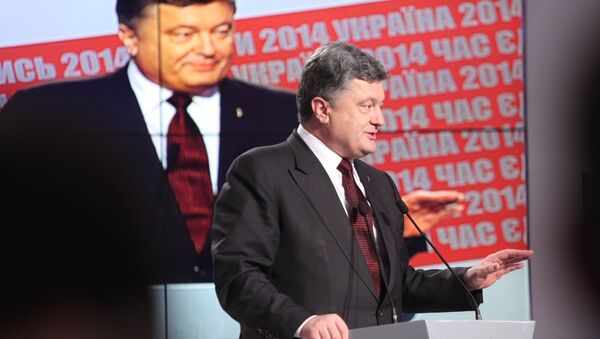WASHINGTON, October 27 (RIA Novosti) — Ukraine President Petro Poroshenko's political party received fewer votes than expected in Ukraine's parliamentary elections according to exit polls, Balázs Jarábik, a scholar from the Carnegie Endowment of International Peace, told RIA Novosti.
"Another kind of important message is that, Poroshenko 23%, if this is going to be the real result, is a clear refusal of the monopolistic party of power. He was expected to get at least 30%. 23% is way below the previous polls and expectations," Jarábik, who was speaking from on the ground in Kiev, said on Sunday.
Jarábik also said the low voter turnout, after a dirty campaign rife with intimidation, violence and vote-buying, reflects the fact Ukrainians have grown weary of politics.
"The turnout was very low. I expected it to be around 50%, the latest polls are showing 40%. [Low voter turnout] shows that Ukrainians are actually getting very tired of politics and of politicians," said Jarábik.
Jarábik also said the results indicate a diversity of perspectives, which might be a positive development for those in favor of pluralism, but it could make governing challenging. In other words, Poroshenko"s government will be hard-pressed to easily implement its agenda.
"It's [diversity] is good for democracy, that there is going to be checks and balances. But it is basically the Poroshenko administration that is drafting the reforms," Jarábik added.
Although the voters sent a clear mandate for reform, the Carnegie scholar defined the reform he was talking about which had nothing to do with issues like individual rights.
"When I talk about reform I am talking about rebuilding the government. There is no central authority so we are talking about rebuilding the state. State capacity and state authority. I"m not talking about democracy or freedom of speech and all these kind of things. No. Key basic state functions is what I"m talking about," said Jarábik.
President Petro Poroshenko dissolved the 450-seat Verkhovna Rada in August and ordered snap general elections to ensure a pro-Europe majority in the parliament while clearing out lawmakers loyal to ex-leader Viktor Yanukovych.
The elections were held against the background of a serious political and economic crisis in the country. Despite the ceasefire agreement on September 5 between between government troops and independence supporters of the self-proclaimed Luhansk and Donetsk people"s republics, both sides have repeatedly accused each other of violating the truce.

